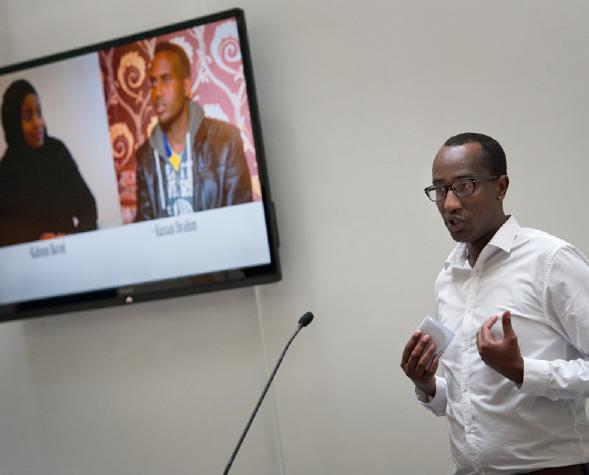
3 minute read
Meeting over youth is held
MEMBERS of Sasca met with police officers to discuss problems which had been reported about troublesome youths in the community.
Police and community support officers discussed ways in which they could help make sure that youths stayed out of trouble and do no cause a nuisance fo r residents in Moss Side.
Advertisement
Sasca members said concern had been expressed to them by parents about rowdy youths on the street and are interested in finding ways to keep them occupied.
suffered as the direct consequence of FGM such as difficulties to have sex with husband, delivering babies, pain during their period and so on. It was really sad to hear any of these stories.
SASCA: I understand that Japan is not one of the countries where FGM is practiced, so what made you to carry out a research on this issue? Is there any particular reason as to why you are so interested in the issue?
Mina: Japan is not one of the countries where FGM is practised, but after I learnt that a significant number of women and girls have had difficulties with their lives having experienced FGM, I strongly felt that I would like to help these situations, and become involved with females who have experienced FGM to help in any way I can.
During my field work, I often considered it to be a good idea for me to carry on my research to learn more about this practice and understand participant’s experiences. Lots of community members encouraged me to continue my research and gave me really positive feedback on our discussions. This positive feedback and support helped me hugely to complete my field research.
SASCA: The UK government has recently tightened laws on FGM, what can you tell us about this?
Mina: FGM is an illegal practice in the UK; however there are only a few cases where practitioners have been arrested. As the decision makers for girls having FGM practised on them or not is commonly a family member (likely their mother), it is difficult for girls to raise their voice about this.
As such, I believe that working together as a local community is important to eradicate FGM and that this can have a bigger impact than the law.
SASCA: Are you conducting your research only on the Somali community or there are other communities involved and do you envisage going to Somalia as part of your research?
Mina: I am only focusing on Somali background people in the UK for my research. However, I’m hoping to involve different background communities as well in the future.
SASCA: How do you think the outcome of your research will impact on the communities where female genital mutilation is widely practiced?
Mina: It is difficult for me to tell you clearly how my research might impact on the communities where FGM is practiced, because it is still at the early stage of my research.
However, some of the community members mentioned that they had never discussed FGM before with family or friends, or even thought about it them- selves. Moreover, some of the people I spoke with didn’t even know what FGM was about. Lots of participants who I undertook interviews with told me that after the interview, they discussed the issue with family and friends. first
Some of the women that I spoke with told me that they had begun to consider why this had happened to them, and how they can change the situation for future generations.
When I heard about these responses from some participants, I believed that my research could be a good starting point for them to think about FGM further, and they could make a positive impact on local communities in the future.
SASCA: What do you think are needed in order to stop this practice, what do the community leaders need to help eradicate this practice?
Mina: I think all community members need to understand what FGM is and why people keep practising it. Having knowledge about FGM and understanding why people practise FGM is significantly important to eradicate this practice in the future. Communication between both older and younger generations could also help to make a difference.wAt the same time, it is important for community leaders to take the lead in eradicating FGM - however I think every community member needs to be involved and act together. Through my field research with SASCA, all community members have been so open minded and friendly. I have been left with a positive impression that different generations and genders can discuss about FGM and act for the future together.







